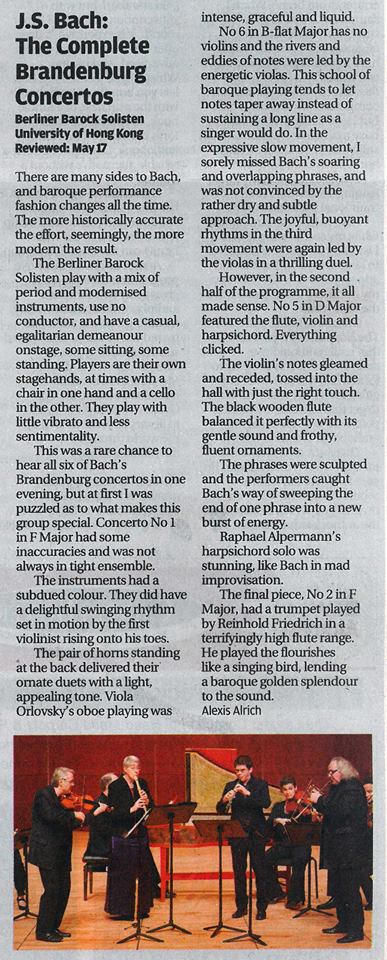South China Morning Post
J.S. Bach: The Complete Brandenburg Concertos
By Alexis Alrich
19 MAY 2015

There are many sides to Bach, and baroque performance fashion changes all the time. The more historically accurate the effort, seemingly, the more modern the result.
The Berliner Barock Solisten play with a mix of period and modernised instruments, use no conductor, and have a casual, egalitarian demeanour onstage, some sitting, some standing. Players are their own stagehands, at times with a chair in one hand and a cello in the other. They play with little vibrato and less sentimentality.
This was a rare chance to hear all six of Bach’s Brandenburg concertos in one evening, but at first I was puzzled as to what makes this group special. Concerto No 1 in F Major had some inaccuracies and was not always in tight ensemble.
The instruments had a subdued colour. They did have a delightful swinging rhythm set in motion by the first violinist rising onto his toes.
The pair of horns standing at the back delivered their ornate duets with a light, appealing tone. Viola Orlovsky’s oboe playing was intense, graceful and liquid.
No 6 in B-flat Major has no violins and the rivers and eddies of notes were led by the energetic violas. This school of baroque playing tends to let notes taper away instead of sustaining a long line as a singer would do. In the expressive slow movement, I sorely missed Bach’s soaring and overlapping phrases, and was not convinced by the rather dry and subtle approach. The joyful, buoyant rhythms in the third movement were again led by the violas in a thrilling duel.
However, in the second half of the programme, it all made sense. No 5 in D Major featured the flute, violin and harpsichord. Everything clicked.
The violin’s notes gleamed and receded, tossed into the hall with just the right touch. The black wooden flute balanced it perfectly with its gentle sound and frothy, fluent ornaments.
The phrases were sculpted and the performers caught Bach’s way of sweeping the end of one phrase into a new burst of energy.
Raphael Alpermann’s harpsichord solo was stunning, like Bach in mad improvisation.
The final piece, No 2 in F Major, had a trumpet played by Reinhold Friedrich in a terrifyingly high flute range. He played the flourishes like a singing bird, lending a baroque golden splendour to the sound.

